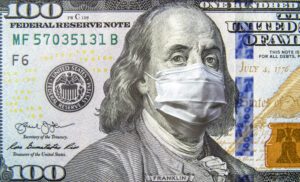Health Care Spending During a Pandemic

In 2019, health care spending in the U.S. rose by 4.6%, for a total of $3.8 trillion. In fact, health care spending accounted for more than 17% of the economy. Spending accelerated in hospital care, physician and clinical services, and prescription drugs (which represented 61% of total national health spending).1
But here’s the interesting bit: 2020 brought a different story. You might have thought that health care spending would increase during a nationwide pandemic. In fact, it was the first year since the 1960s that year-over-year spending on patient care actually dropped — as of the third quarter of 2020, health care spending was down about 2%. The biggest reductions were in elective care, doctors’ office visits and outpatient clinics — many of which shut down.2
Early on, there was an abrupt drop in cancer screenings, and the biggest reduction in spending occurred during the second quarter, when most people stayed at home. However, hospitalizations for COVID-19 spiked in the last two months of 2020, so it is not yet clear how total health spending will pan out for the year.3 It will take time and future studies to determine how much health outcomes suffered due to decreased utilization — but such data may help us evaluate how much we can safely reduce health spending in the future.4
As far as the individual health insurance market is concerned, insurers plan moderate rate changes for 2021. An analysis by KFF (Kaiser Family Foundation) says a majority of 2021’s proposed rate changes range from a 3.5% decrease to a 4.6% increase. Insurers report they anticipate higher health care spending in the areas of COVID-19 testing, widespread vaccinations, a rebound from the delay of medical services and higher death rates due to deferred or foregone care. However, they also acknowledge that many people may continue to avoid seeking medical services in deference to the coronavirus impact.5
Regardless of whether you expect your own medical spending to increase or decrease, it’s important to create a strategy for your income to weather the economic ups and downs. Call us if you’d like to discuss insurance options to help protect your finances against future economic setbacks.
If we can help in any way give us a call at 801-990-5050.
Our firm assists retirees and pre-retirees in the creation of retirement strategies utilizing investment and insurance products. Advisory services offered through B.O.S.S. Retirement Advisors, an SEC Registered Investment Advisory firm. Insurance products and services offered through B.O.S.S. Retirement Solutions.
1 Anne B. Martin, Micah Hartman, David Lassman and Aaron Catlin. Health Affairs. Dec. 16, 2020. “National Health Care Spending In 2019: Steady Growth For The Fourth Consecutive Year.” https://www.healthaffairs.org/doi/10.1377/hlthaff.2020.02022. Accessed Dec. 29, 2020.
2 Cynthia Cox and Krutika Amin. Peterson-KFF. Dec. 1, 2020. “How have health spending and utilization changed during the coronavirus pandemic?” https://www.healthsystemtracker.org/chart-collection/how-have-healthcare-utilization-and-spending-changed-so-far-during-the-coronavirus-pandemic/#item-start. Accessed Dec. 29, 2020.
3 Ibid.
4 Drew Altman. KFF. Dec. 2, 2020. “COVID-19 Is Causing Health Spending To Go Down.” https://www.kff.org/coronavirus-covid-19/perspective/covid-19-is-causing-health-spending-to-go-down/. Accessed Dec. 29, 2020.
5 Daniel McDermott, Nisha Kurani, Giorlando Ramirez, Nicolas Shanosky and Cynthia Cox. KFF. Oct. 19, 2020. “2021 Premium Changes on ACA Exchanges and the Impact of COVID-19 on Rates.” https://www.kff.org/private-insurance/issue-brief/2021-premium-changes-on-aca-exchanges-and-the-impact-of-covid-19-on-rates/. Accessed Dec. 29, 2020.
Ready to Take The Next Step?
For more information about any of the products and services listed here, schedule a meeting today or register to attend a seminar.

